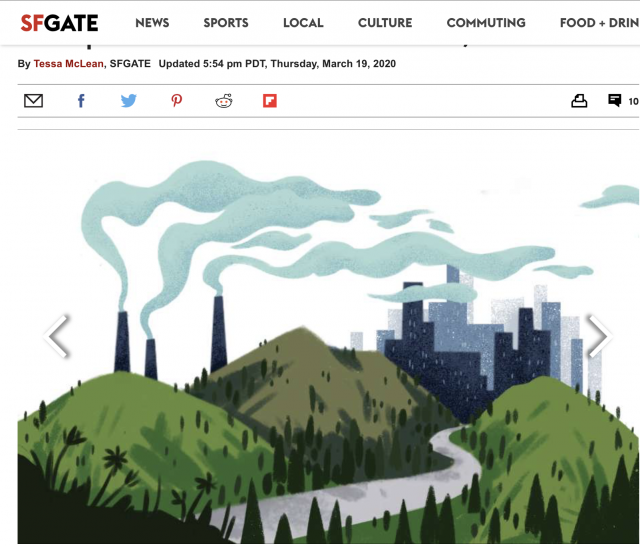NEWS COVID-19: SF air pollution is 38% lower than normal, but will it last?
For the original in The San Francisco Chronicle, click here.
Sheltering in place has plenty of downsides, especially economically, but there is one thing you can feel good about if you’ve taken to working from home. It’s likely drastically reducing Bay Area air pollution.
SF air pollution is 38% lower than it was at this time in 2019, according to the EPA. This is likely largely due to decreased transportation, which accounts for up to 30% of the typical U.S. household’s emissions, whether driving or taking public transportation.
During recent quarantine measures in China, there was also a direct impact on pollution levels. NASA and the European Space Agency (ESA) pollution monitoring satellites detected significant decreases in nitrogen dioxide (NO2) over China when comparing Jan. 1–20, 2020 (before quarantine) and Feb. 10–25 (during quarantine). Nitrogen dioxide is emitted by motor vehicles, power plants and industrial facilities.
According to NASA scientists, the reduction in NO2 pollution was first
apparent near Wuhan, but eventually spread across the country. “This is the first time I have seen such a dramatic drop-off over such a wide area for a specific event,” said Fei Liu, an air quality researcher at NASA’s Goddard Space Flight Center in the NASA post.
The drop in nitrogen dioxide did coincide with Lunar New Year celebrations, where generally businesses and factories close to celebrate. Air pollution usually decreases during this period and then increases once the celebration is over, but this year the country didn’t see an increase.
While the U.S. may see similar reductions in emissions as people are driving and flying less, it likely won’t have a lasting effect, warned Daniel Kammen, an energy professor at U.C. Berkeley.
“We’ve seen this after 9/11 and during the Beijing Olympics,” Kammen said. “Emissions went down temporarily but then they roared back afterward as factories reopened and everyone made up for lost production. Looking at this emission drop is exceedingly deceptive.”
Kammen, who was formerly a science advisor to the Trump administration (he resigned over the president’s 2017 response to the Charlottesville demonstrations) and also served as an adviser to the Obama administration, also noted that looking at just our own emissions doesn’t tell the whole story. For example, much of the emissions coming from China are because of U.S. goods being made there. He said he hopes people understand the full impact of an individual’s carbon footprint and that while he cautions getting overly optimistic about the decrease in pollution, what we learn during the crisis could have a larger impact on the working world.
“We could be able to take some lessons from this on how to be climate-smart,” Kammen said. “If we learn from this crisis that we could shift a lot of our IT activities, our conferences, etc. to use Zoom and Slack and the like then that’s a good lesson. These are ways we can decarbonize our economy.”
While the environmental impacts may not be sustained, they have had short-term gains. Marshall Burke, an assistant professor at Stanford’s Department of Earth System Science, wrote that while the harms the virus will cause will likely far exceed any health benefits from reduced air pollution, it may have saved the lives of between 50,000 and 75,000 people. “The reductions in air pollution in China caused by this economic disruption likely saved twenty times more lives in China than have currently been lost due to infection with the virus in that country,” Burke wrote on G‑Feed, a site run by a group of scientists researching the relationship between society and the environment.
While there are health benefits of the air pollution changes, Kammen cautioned about the long-term impacts to the economy that we can’t yet know that could also impact the environment. “There is no question that we’re seeing big carbon impacts due to coronavirus,” he said. “We won’t be able to say the reduction is a good thing because the economic impacts are going to be so large.”
U.C. Berkeley researcher and professor Dennis D. Baldocchi also said it’s likely too early to understand any of the effects coronavirus will have long term, but he agreed that we could learn from this new way to work. “Often with the environment, there are winners and losers. You try to do one good thing and one thing pops up that’s unintentional,” he said. “But this could show that we can function differently in the future and still be socially interactive.”
Baldocchi also acknowledged the unknown impact of the increased waste right now, like everything from plastic hand sanitizer bottles to more takeout containers to medical equipment.
“It’s too early to say what the impacts are right now, but if we revisit in March 2021 and compare it to this year it will be very interesting,” he said.

You must be logged in to post a comment.